|
December 19, 2019
Ontario Federation of Labour Holds
Biennial Convention
Ontario Workers Seek to Strengthen
Resistance to Ford Government's Anti-Social
Offensive
- Steve Rutchinski -
 March on Queen's Park,
November 27, 2019, by delegates of the OFL
convention. March on Queen's Park,
November 27, 2019, by delegates of the OFL
convention.
• OFL's Responsibility
to Develop the Protest Movement and Take
It Further - Workers' Centre of
CPC(M-L)
Quebec Government's Unacceptable,
Irresponsible and Provocative Offer
• Public Sector
Workers Demand Significant Negotiated
Improvements to Wages and Working Conditions
- Pierre Chénier
Interviews
• Latest Offer Does
Nothing to Make Up for 20 Years of Losses
- Jeff Begley, President, Federation
of Health and Social Services
• The Need for More
Staff and Improved Wages and Working
Conditions - Natalie
Crytes-Veillette, Quebec Union of Service
Employees, Local 298 - FTQ
Telecommunications
Workers on Strike at Ledcor Technical
Services in BC
• Standing Up for
Rights Against Precarious Work -
Brian Sproule
Interview
• Gino Ocampo, IBEW
Local 213 Picket Captain
• Note
to Readers
Ontario Federation of Labour
Holds Biennial Convention
- Steve Rutchinski -
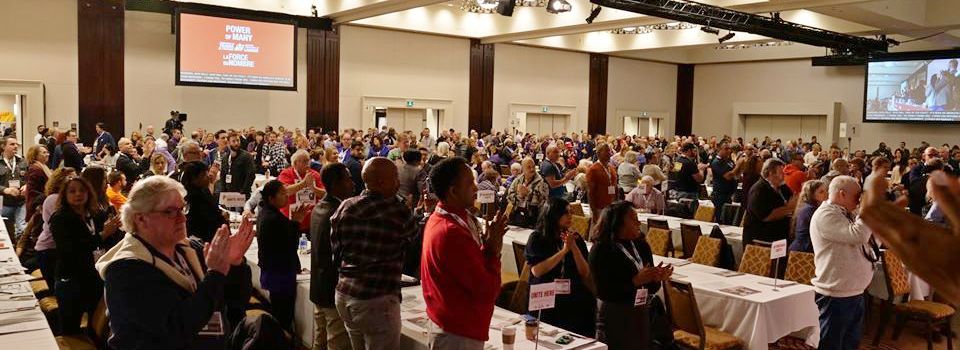
Convention floor, on day one of the OFL
convention, November 25, 2019.
The Ontario Federation of Labour (OFL) held
its 15th Biennial Convention during the week of
November 25-29 at the Sheraton Hotel in Toronto.
The OFL represents one million workers organized
in 15,000 locals from 54 unions.
The convention was held amid the Ford
government's escalating attacks on the working
people of the province and the services they
provide that the people of Ontario depend on for
their well-being. Delegates shared their
experiences and discussed the challenge the Ford
government's anti-social offensive poses to the
well-being of the workers and people of Ontario.
The wrecking of the economy through the
privatization of public services such as health
care, the cuts to jobs, the disregard for the
environment, the plight of young workers and
other issues of common concern were discussed.
A key feature of the convention was the
introduction, discussion and adoption of the
Power of Many vision document and action plan
which sets the direction of the OFL for the
coming period. It calls on workers to establish
conditions in Ontario that permit everyone to
flourish regardless of status or any other
consideration and emphasizes the responsibility
of the workers to fight for this. It states that
"Doug Ford is a clear and present danger to
Ontario. He remains the key adversary to decent
work for all, the provinces cherished public
services, justice and all working families and
their communities." In that vein, it also calls
for coalitions to be formed across the province
whose aim is to "deliver an NDP government in
Ontario in 2021." This raises the question of
what it means for the workers to empower
themselves, so that they can speak in their own
name and realize the pro-social conditions they
are fighting for every day, and whether this is
the same thing as joining a coalition to elect
the NDP.
Ontario workers are preparing for the Ford
government to introduce more neo-liberal
anti-worker legislation, after it declared the
province "open for business" and launched its
brutal anti-social offensive. They are paying
close attention to the struggles being waged by
Alberta workers in the face of such attacks by
the United Conservative Party government led by
Jason Kenney. One speaker, labour lawyer Joshua
Mandryk, noted that workers should be prepared
for the Ford government to introduce anti-worker
legislation, including legislation to make union
organizing more difficult, similar to
legislation introduced by the Kenney government
in Alberta, which he said is a trial balloon for
U.S.-style right-to-work legislation.

One of the panel discussions at the OFL,
November 28, 2019, dealt with the fight of
workers for safe and healthy workplaces and to
get compensation when they are made ill at work.
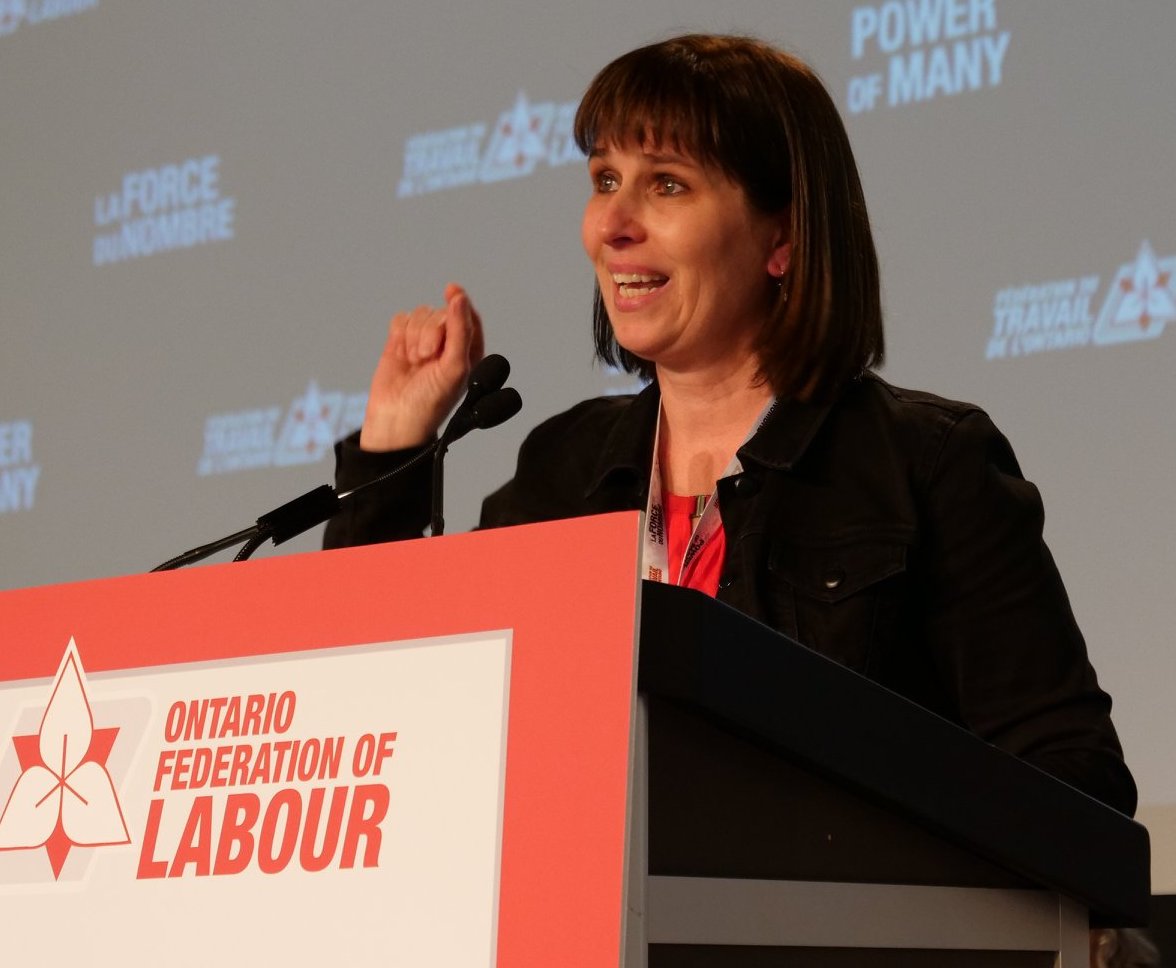
Janice Martell addresses panel on
Occupational diseases, held as part
of the OFL convention, November
28, 2019.
|
Injured workers and their collectives brought
out the plight of those suffering from workplace
injuries and occupational diseases. Natasha
Luckhardt, producer of the documentary Town
of Widows, spoke about the General
Electric workers in Peterborough who have died
of cancer and other diseases as a consequence of
being exposed to asbestos and other toxic
chemicals in the plant, and the courageous fight
waged by their families for justice and
compensation. Janice Martell, the founder of the
McIntyre Powder Project, highlighted the need to
step up the fight to stop the Workplace Safety
and Insurance Board (WSIB) victimizing and
targeting the injured workers it should be
helping. She shared the findings of her own
inquiry into the health effects of McIntyre
Powder, which companies forced miners to inhale
from the 1940s to 1970s, allegedly to prevent
silicosis. Martell stated that as a result, her
father and other miners developed respiratory
and other disabling health conditions. To date,
the WSIB has refused to recognize their claims.
The plight of young workers in the "gig
economy" was also a topic of discussion at the
convention. A panel of young workers shared
their experience with the temporary and
precarious contract work that many young workers
are forced to do to earn a livelihood. Delegates
discussed the need to organize these workers
into unions to defend their rights.
On November 27, convention delegates held a
rally and march to Queen's Park to express their
opposition to the Ford government's anti-social
offensive against the people of Ontario. Speaker
after speaker denounced the Ford government and
pledged to step up their united action against
it.
 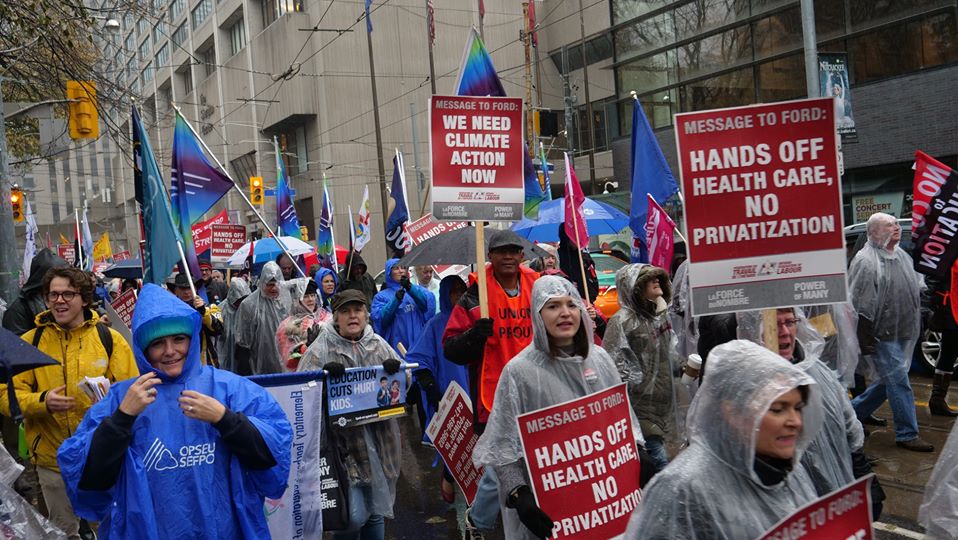
OFL delegates march to Queen's Park, November
27, 2019.
Resolutions passed by the convention include
ones that expressed support for Ontario teachers
and education workers, opposed the plans of the
Ford government to privatize ambulance services,
called for it to maintain full-day kindergarten,
and condemned Canada's involvement in the coup
in Bolivia against President Evo Morales.
The delegates elected new leadership, with
Patty Coates, an education worker and member of
the Ontario Secondary School Teachers'
Federation, elected the first woman president of
the OFL. Ahmad Gaied, a member of the United
Food and Commercial Workers Union, was elected
Secretary Treasurer, and Janice Folk-Dawson, a
member of the Canadian Union of Public
Employees, was elected Executive Vice-President.
All pledged to lead and step up the fight
against the anti-worker and anti-social
austerity agenda of the Ford Progressive
Conservative government.
  
New OFL executive (left to right): President
Patty Jarvis Coates, Secretary Treasurer Ahmad
Gaied, Executive Vice-President Janice
Folk-Dawson.

- Workers' Centre of CPC(M-L) -
The call of the OFL Convention for coalitions
to be formed across the province whose aim is to
"deliver an NDP government in Ontario in 2021"
poses a serious concern for the workers. Since
the Days of Action against the Harris
government, the OFL wants to run from its
responsibility to develop the protest movement
and take it further. It does not want to
completely withdraw from the movement but rather
orient it towards the fulfilment of the aims of
one of the cartel political parties which claims
to represent the interests of labour, the NDP.
In this respect, the NDP has long since emerged
as a disruptive and splittist force in the
movement because it pushes its own sectarian
aims. While the workers have been rejecting this
splittist aim in favour of resolving the crisis
in a manner that favours them, the OFL
vacillates, trying to steer its focus towards
the role of the NDP more than to the role of the
trade unions. The NDP has its own self-serving
aim, which is to come to power, and it tells the
people that the solution is to vote to bring the
NDP to power. That is all that they need to do,
the people are told.
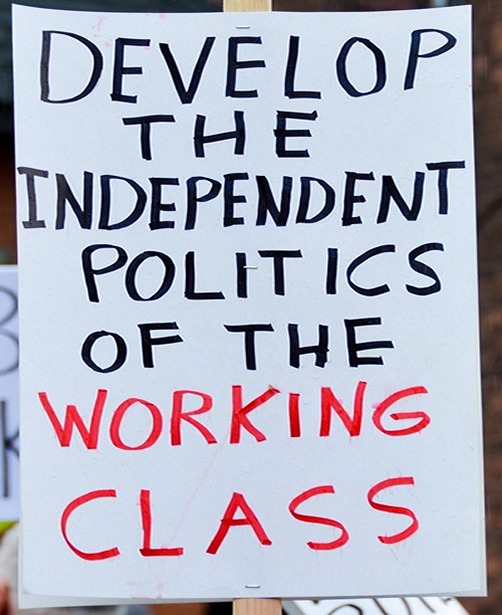 The aim of the
trade unions established in the past, and of
their associations like the OFL, was never to
radically transform the situation. However, the
conditions today are calling for the workers to
play a political role by realizing their
striving for empowerment so that they can
control the decisions which affect their lives.
Should the OFL take the movement further than
its narrow trade union aim what would be exposed
is that the sectarian, disruptive and
self-serving role of the NDP is the real
problem. It is one of the parties which form a
cartel party system to keep the people out of
power. It competes to be a force that brokers
who will occupy the positions of premier or
prime minister, the cabinet ministers, the
secretaries and the top echelons of the civil
service and so on. This brokering is used to
divert the attention of the workers from the
need to stick with the aim of their class. The aim of the
trade unions established in the past, and of
their associations like the OFL, was never to
radically transform the situation. However, the
conditions today are calling for the workers to
play a political role by realizing their
striving for empowerment so that they can
control the decisions which affect their lives.
Should the OFL take the movement further than
its narrow trade union aim what would be exposed
is that the sectarian, disruptive and
self-serving role of the NDP is the real
problem. It is one of the parties which form a
cartel party system to keep the people out of
power. It competes to be a force that brokers
who will occupy the positions of premier or
prime minister, the cabinet ministers, the
secretaries and the top echelons of the civil
service and so on. This brokering is used to
divert the attention of the workers from the
need to stick with the aim of their class.
The idea that the working people have a choice
between one party and another through elections
has been debunked time and time again. The
workers want real problems to be solved and
detest the splitting of the movement on the
basis of party politics.
The workers' movement against the anti-social
offensive has an aim which is to defeat the
anti-social offensive. This is achieved in a
practical way by winning victories for a
pro-social program which the working people work
out themselves as they are doing every day
through the struggles they wage to affirm what
belongs to them by right. This aim to defeat the
anti-social offensive has to be taken through to
the end. It means that as the workers'
collectives deliberate on their actions, they
must pay attention to not allow the aim of the
movement to be put in a secondary position; they
should not permit it to be subordinated to
narrow aims such as the aim to elect the NDP.
Time and again the NDP shows that it is
interested in coalitions only so long as such
coalitions agree to submit to its aim.
The call of the Workers' Centre of CPC(M-L) is
to stick with the aim of the movement. The issue
is not whether workers support CPC(M-L) or the
NDP or something else. The issue is to realize
the aim of the movement.

Quebec Government's
Unacceptable, Irresponsible and Provocative
Offer
- Pierre Chénier -

On December 12, the Quebec government presented
its central offer to union representatives in
the public sector, as part of the negotiations
for the renewal of the collective agreements of
some 550,000 public sector workers. These
collective agreements expire on March 31, 2020.
As soon as the government had tabled its offers,
all the unions rejected them as being out of
touch with the reality on the ground and
insulting to the workers and the demands they
have consistently put forward to significantly
improve the situation.
The government's offer provides for a seven per
cent wage increase over five years, which
amounts to at least three per cent less than the
inflation rate estimated by experts over the
same period. The government is also proposing a
lump sum payment of $1,000 for workers on the
job as of March 31, 2020 who will have reached
their maximum wage scale limit as of that
date. It is estimated that the lump sum,
separate from wages, will only apply to around
50 per cent of the workers involved in the
negotiations. The government is also proposing
to hold three joint discussion forums (of
representatives of employers and workers) on
educational success, access to care for people
in long-term health care facilities or receiving
home care and the overall health of public
sector workers, where additional funds may be
released. Here the government is referring in
particular to caregivers and new teachers.
According to the government, the wage offer,
the lump sum and the additional funds make up an
offer equivalent to inflation, the ceiling it
has set for itself in the negotiations in the
name of Quebeckers' ability to pay and of not
increasing the tax burden on future generations.
The government has declared that its offer is an
acceptable basis for discussion and negotiation
with public sector employees.
This offer continues the practice of previous
governments in refusing to recognize that public
sector workers create immense value for the
society, upon which they have a legitimate
claim. Workers have the right to a negotiated
settlement for their own well-being as well as
for that of the public services they deliver.
The government is also refusing to admit that
the anti-social austerity agenda has brought
public services to a breaking point. A feature
of this, amongst others, is staff exhaustion, a
high level of absenteeism related to sickness
which further exacerbates the exhaustion of
those who remain at work, and the development of
acute mental health problems and psychological
distress amongst workers.
Clearly the government is closing its eyes to
the fact that insufficient wages are at the
heart of the problem of workforce recruitment
and retention and therefore of mental health and
distress. It has cynically calculated that it
will use the power of the state to ensure that
the system continues to operate despite the
crisis and that public sector workers continue
to keep the system going against all odds. The
workers do so largely out of dedication to those
they care for and to the youth they educate.
Fundamentally, the government's attitude is no
different from that of previous governments
which paved the way for disasters like that in
Lac-Mégantic through their refusal to take up
their social responsibilities and as a result of
their obsession for narrow private profit.
Furthermore, the government's claim that its
offer is a starting point for good faith
bargaining is false. Good faith bargaining would
require a qualitative element, the recognition
of the contribution that public sector workers
make to society, respect for their dignity and
the recognition of their right to negotiated
wages and working conditions they deem
acceptable. None of this exists in their offer.
It therefore is not a basis for negotiation and
can only be rejected with contempt.
Workers' Forum joins with the hundreds
of thousands of Quebec public sector workers in
rejecting this offer in its form and content and
demands that the government significantly
improve public sector wages and working
conditions. On the occasion of the renewal of
their collective agreements, Workers' Forum
is opening its pages to the struggle of
public sector workers and will provide relevant
information, analysis and views and give pride
of place to their voices.
Enough is Enough!
For an Immediate and Significant Improvement in
Public Sector
Wages and Working Conditions!

Interviews
- Jeff Begley, President,
Federation of Health and Social Services
(FSSS-CSN) -

Workers' Forum: On December 12,
the Quebec government presented its offers to
union representatives as part of the negotiation
of collective agreements for public sector
workers. What is the opinion of the FSSS on
these offers?
Jeff Begley: It is clear that the
offer is disconnected from the needs in the
field. We have problems with employee retention
and recruitment, and this problem exists in all
categories of work in the sector. The government
is saying that it is going to single out
contracts for caregivers and new teachers for
improvement. However, we just heard the
professional orders talking about the problems
they have in attracting professionals to the
public sector. Those who are completely
forgotten here are the people who work on the
administrative side, office workers and
administrative agents. We never talk about them
but there too there is a serious problem of
retention and recruitment.
This offer does nothing to make up for what we
have lost over the last close to 20 years, and
especially since the 2006 negotiation, which was
the first negotiation with the Liberal Party.
That began with an offer of a zero per cent
increase in the first two years. According to
us, the sector has lost about 20 per cent over
nearly 20 years in terms of inflation. For the
people in the administration, we are referring
to low-paid workers and if the offer does not
keep up with inflation, so they are going to
suffer a further loss for another five years if
a serious negotiation does not take place.
The other surprising thing is the attempt to
sow divisions with this offer. We knew they were
going to divide caregivers and new teachers from
other public sector employees, but they also
offered a lump sum of $1,000 for those at the
top of their wage scale. According to the
President of the Treasury Board, approximately
54 per cent of public sector workers are at the
top of their wage scale. So there are 46 per
cent who will not receive the $1,000 lump sum.
In addition, there are people who have a wage
scale with only one level. They could be hired
on March 30 and on March 31 they will receive
the $1,000 while others who may have been in the
sector for 15 years but are not yet at the top
of the scale will not be entitled to the $1,000.
This will sow bickering. The President of the
Treasury Board did not explain why he is
proposing this. There may be an issue that we do
not see, but one thing is certain, whether it is
intentional or not, the result will be to divide
our people. There are some who are going to be
very upset, that's for sure, and rightly so.
WF: The President of the Treasury
Board said he had adopted an innovative approach
to these negotiations, notably with discussion
forums on government priorities for which
additional amounts are to be made available.
What is your view on that?
JB: On the issue of forums, we
haven't finished our analysis but our first
reaction is that we have to test what it is they
are offering us. We have to participate. There
are solutions that would not have the effect of
dividing people and we have to see if there will
be an opening for that. But if the President of
the Treasury Board already has his mind made up,
and these are just to get his ideas across, it's
not going to go well. If there is an opening to
discuss, then there may be ways to resolve some
problems but we do not want the goal to be to
divide and conquer, like dividing the caregivers
and new teachers from the others. It will not
pass if that is the government's aim.
WF: Is there anything you want to
say in conclusion?
JB: At the FSSS, we have asked
for a $3 an hour wage increase for everyone for
the first year, to meet their basic needs. For
the employees at the bottom of the scale it is a
substantial increase while for the professional
at the top of the scale this represents a much
smaller percentage increase. At the same time,
for the professionals, this amount is important
because it lowers the wage gap between those in
the public versus the private sector.
I think that in presenting this offer the
government did not take stock of the seriousness
of the situation in the public sector. If there
is no significant negotiated improvement of our
conditions, public sector problems will get
worse and it will be the public service as a
whole that will suffer once again.

- Natalie Crytes-Veillette,
Quebec Union of Service Employees, Local 298,
FTQ -

Demonstration during the FTQ Congress in support
of striking workers in private seniors'
residences, November 26, 2019.
This interview was conducted at the 32nd
Congress of the Quebec Federation of Labour,
November 25-28.
Workers' Forum: One of the
salient features of the Quebec Federation of
Labour's Congress is the intervention from the
most vulnerable health care workers, who are
demanding an immediate and significant
improvement in their wages and working
conditions. Can you tell us more?
Natalie Crytes-Veillette: I
myself am a caregiver in a Residential and
Long-Term Care Centre (CHSLD) in the
Deux-Montagnes region. A major problem is the
acute shortage of personnel. At my work place,
people are not staying. Many are off sick. Out
of some 80 employees, there may be 25 on sick
leave. Increasingly, we receive residents who
have complex cases. When we are already
understaffed and then have to deal with more
complex cases, it makes for heavier caseloads
and additional hours of care, and we are unable
to properly complete our work days and provide
the quality care these people deserve.
Fatigue, exhaustion and numerous injuries are
very common occurrences amongst employees. They
are related to a shortage of staff, combined
with the fact that the caseloads are
increasingly heavy. Many of our residents
require a lift to move them from one position to
another, which requires two caregivers working
together. More staff are needed. Some people are
thinking of leaving and I understand them.
There's nothing attractive about the profession
at the moment.
Financially, we need better wages. It's a
serious problem. I have seven years of seniority
at my workplace and already I'm amongst the 20
people there with the most seniority, out of a
total of approximately 80 employees. Better
wages are required to address the problem of
recruitment and retention. The job deserves
better wages. There's a lack of recognition, on
the part of government and employers, of the
work we do caring for seniors.
Within such conditions, we are unable to
provide residents with the services they
require. They should be given more time with us.
There are residents who, on an individual basis,
we don't even get to spend five minutes a day
with. These people deserve to have someone there
for them. People in positions of authority
should leave their offices and spend a day with
us on the floor. I once told my Director that
what is happening on the floor has nothing to do
with my values and that day, I left early. The
situation has reached the point that residents
are beginning to feel embarrassed about asking
us for certain services because they see that we
are understaffed. They need us, which is why we
keep working at the CHSLD. Although we are not
required to do overtime, we sometimes do it for
financial reasons, but the main reason we work
overtime is out of duty, because the residents
need to be taken care of.
Our situation is difficult. Besides caring for
the residents lying in bed, we must also take
care of the worried or concerned family members
accompanying them.
The wages and working conditions of people
working in CHSLDs must be significantly
improved.

Telecommunications Workers on
Strike at Ledcor Technical Services in BC
- Brian Sproule -
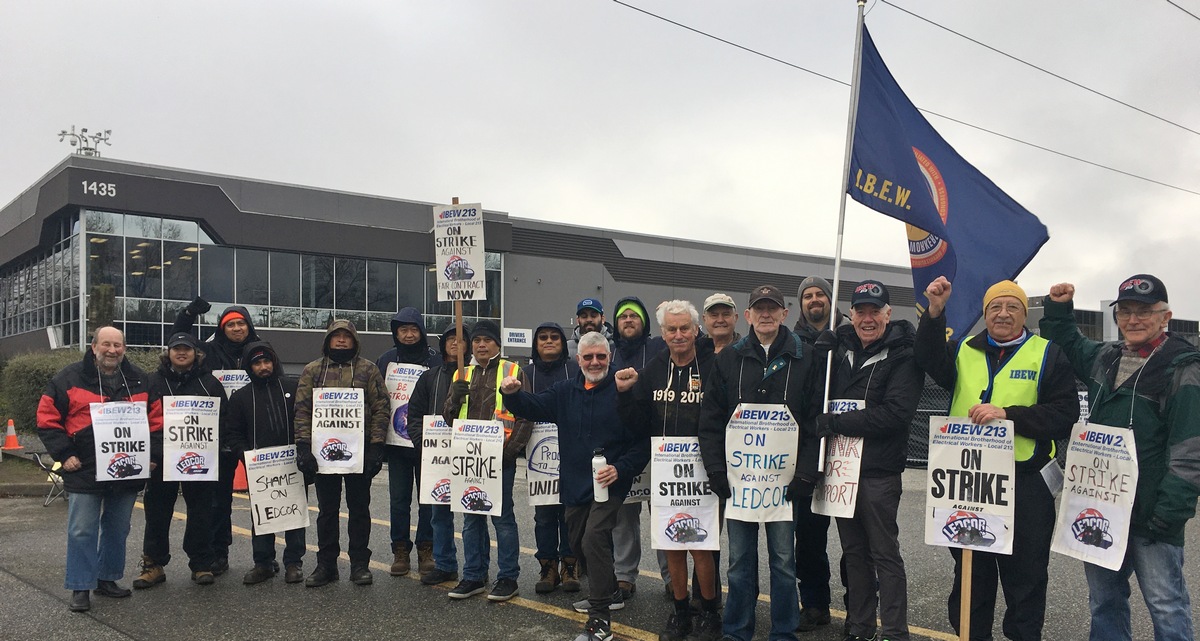
On December 10, 2019 representatives of the
Workers' Centre of CPC(M-L) joined the regular
picket line along with a number of retired
electrical workers.
Telecommunications workers, members of the
International Brotherhood of Electrical Workers
(IBEW) Local 213, have been on strike against
Ledcor Technical Services (LTS) in Port
Coquitlam, BC since September 30. The workers
are seeking a first contract. Their main
concerns are to put an end to their precarious
job status and improve working conditions,
including an end to piece work and recognition
of seniority. The company's practice of paying
piece rates instead of hourly wages puts
pressure on the workers to speed up, thus
increasing the danger of accidents and injuries
to workers and the public. The piece rates often
result in pay that is barely above minimum wage.
LTS is part of the giant multinational Ledcor
Group, which calls itself a "diversified
construction company working to design, build,
transport and maintain projects" all over North
America. Ledcor employs some 7,000 people in
several divisions including navigation and
aviation. The company claims to treat its
workers like "family" but the experience of the
technicians in Port Coquitlam tells a completely
different story.
In 2017, these workers at LTS joined the
International Brotherhood of Electrical Workers
(IBEW). At the time of certification of their
certification as IBEW Local 213, there were 238
members. By the time a dispute with the company
over the makeup of the bargaining unit was
resolved, with the Labour Board ruling in the
union's favour in January 2019, the company had
reduced the workforce to 161. Over the course of
17 days of bargaining, nothing significant
regarding the main demands of the workers for an
end to piece work rates, precarious employment
and dangerous working conditions was achieved.
At a union meeting on the evening of August 21,
following a rally earlier in the day outside the
Ledcor offices in Vancouver to demand that LTS
bargain seriously with the union, workers voted
in favour of strike action. Instead of
bargaining seriously with the union, the company
carried out a mass layoff of 31 workers on
September 25. The union responded with 72-hour
strike notice, and on September 30, LTS workers
walked off the job and began picketing the LTS
office in Port Coquitlam.
The main work of the IBEW Local 213 members is
the installation of fibre-optic cable. LTS
contracts with various companies, one of the
major ones being Telus, to do this work. Telus
also has its own employees, members of USW Local
1944, who work on its fibre-optic network. The
technicians employed by LTS are paid less and
endure working conditions that are significantly
inferior to those of the USW Local 1944 members
when they perform contract work on the Telus
network. In an October 18 statement of support
for the striking LTS workers, USW Local 1944
Secretary-Treasurer Michael Phillips said, "When
Telus and its contractors are permitted to play
'race-to-the-bottom' with technicians' wages and
working conditions, all members lose whether
they are USW 1944 or IBEW 213. [...] The less
Telus' contractors are paid, the greater the
threat that more of our work will be contracted
out for cost savings, it's that simple. The
better a deal these strikers get, the better a
deal we can fight for in our own bargaining with
Telus in two years' time." He called on members
of his local to assist the striking IBEW Local
213 workers by responding to the request of IBEW
Assistant Business Manager Robin Nedila to
report any work being done by scabs working for
LTS by text to 604-786-0304. Other unions and
the Vancouver and District Labour Council have
asked members to do the same.
Arrangements like Telus' contract with LTS is a
means of undermining the collective of workers,
their wages and working conditions. Telus
contracts out the work to put pressure on its
employees to moderate their demands for wages
and working conditions that are acceptable to
them. LTS and other contractors pay substandard
wages and try to claim that their workers are
"independent contractors" and not employees to
avoid basic labour and safety standards and
impose a regime of precarious work. This modus
operandi of the monopolies is becoming all
too common and requires that workers step up
their organizing, their resistance, and their
solidarity. Workers' Forum stands with
the LTS workers who, in defending their rights,
are defending the rights of all.

Interview
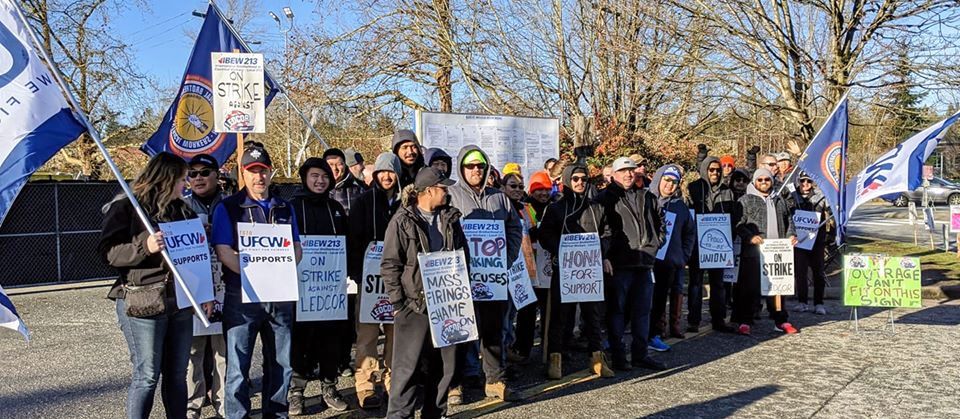
Solidarity picket at Ledcor Main Office in
Vancouver in support of IBEW 213 members on
strike against Ledcor Technical Services,
November 21, 2019.
Workers' Forum: We are on the IBEW
213 picket line in Port Coquitlam on December 10.
What can you tell us about your fight for a first
contract?
Gino Ocampo: In November 2017 we
were granted certification from the Canada
Industrial Relations Board. Negotiations were
breaking down so we had mediation as well but
the company wouldn't sign anything, even the
union's basic human rights language. When the
bargaining committee asked for a strike vote 79
per cent of us voted to strike. Shortly after
that 31 of our colleagues were called randomly
by their managers and told "Hey, you have to
report back to the office. We have an update for
you." So 31 of them walked in. They were asked
to give their keys and company vehicles back,
and the managers told them, basically, "get
lost." Taxis were waiting to take them out. They
were told "This is your last day, Sorry, we have
no work for you." and that was the end of it.
Most of our guys were scratching their heads,
thinking "What did I do? What's going on here?"
This is day 70 of our strike. To date we have
seen Ledcor Technical Services (LTS) opting to
go for subcontractors instead of negotiating
with us. Telus is subcontracting to LTS and LTS
is subcontracting to others. They are being paid
piece rate as well. They are not paid an hourly
rate. They are all called self-employed. That's
the way the industry is evolving right now,
contractors and more contractors.
WF: Is Telus the main contractor
for LTS work?
GO: Yes. Shaw is big here in the
Lower Mainland but they do have unions
entrenched in their company. They are more
secure than we are. They are not allowed to hire
subcontractors if they lay off their union
employees. [...]
Ledcor has a corporate office in downtown
Vancouver. That's where the main BC office is.
We have had rallies there and we basically
divided the picketing crew into two groups. One
group in Coquitlam and the others, that live on
the other side of the bridge, picket the main
office. We rotate between morning and afternoon.
We picket eight hours a day and everyone is
welcome.
WF: What support do you have and
what can people do to support you?
GO: Lots of people drop off hot
coffees and cocoa from time to time which helps
us. We are fighting for our rights and we
appreciate the general public giving us whatever
support they can. [...] The mayor visited us
once, the President of the BC Federation of
Labour came, and some councillors came to show
support. We asked them to post pictures and
information on their webpages or Facebook
accounts to help to spread the word. We are not
a big union. Given the current disputes going on
in BC we are being overlooked, so nobody knows
about our strike here.
We are asking people who are Telus customers
and need technicians, please do not let a LTS
contractor in, a LTS non-union employee. If you
are a Telus subscriber do not let any Ledcor
technicians into your place until we get a fair
agreement. Telus has their own in-house
technicians who are unionized, represented by
United Steelworkers, but most of this work is
being subcontracted. That's the nature of their
business. It's a process of downgrading the
union power. They are finding ways to get around
the union workforce.
With Ledcor we work on a piece-work basis. If
we don't work we don't get paid. Right now the
health benefits of most of the strikers have
been cut off because we are on strike. We are
getting basically minimum wages right now with
strike pay, without any health benefits, so we
are left to our own devices. Most of us are in a
really precarious state right now. Most of us,
as you can see, are immigrants. That's what the
big companies are doing right now. Hiring
newcomers into Canada so that when you get rid
of them no one will complain. I came to Canada
11 years ago and have seen that unions get a bad
rap. I have seen the rank and file go down,
having bad press. We're just fighting for basic
human rights of better wages, better living
conditions. [...]
We are skilled workers. We were trained by the
original Telus employees, for months on end, and
we are basically the best of the group. The
people you see here are the ones that are left,
they couldn't get rid of us that easily because
we are the highest performing technicians...
The three big companies have a monopoly. A
couple of years ago a U.S. company wanted to
enter Canada, ads were on the TV saying be
patriotic, don't let any other companies get
into Canada, it will destroy the Canadian
industry. But what are they doing to us? They
are taking advantage of their workers. They are
taking advantage of their customers. Something
has to give.
WF: How many workers are on
strike, how many are employed by Ledcor?
GO: We are several hundred,
divided into different departments. We have the
technicians and we have what we call the MxU,
the built-in. What happened to the built-in is
they were part of our collective and they were
part of the strike vote. They voted yes. But
when the union asked for the actual strike they
opted to cross the line, so our number was
diminished from 100 plus, we are now left with
just over 60. So that's a big blow for us,
seeing our colleagues cross the picket line. It
really hampers our power to negotiate. As you
can see on the information board, 48 per cent
are on strike and 52 per cent are working
because they already laid off 31 of us. You
should be on the right side of history when you
are writing your own history. Will you be that
guy that stabbed your own colleague in the back
or will you be the one who stood up and fought
for your colleagues? That's why we are asking
people to tell Telus that they won't allow an
LTS technician into their home.

This is the last issue of Workers' Forum
for the year. We will resume publication on
January 15, 2020.
In the meanwhile, please continue to visit
CPC(M-L)'s website for up-to-date information
and take a look at the TML Daily 2019
Photo Reviews on the fight of the workers,
women, youth, and Indigenous peoples, speaking
and acting in their own name to uphold the
rights of all and make Canada a zone for peace.
The year 2019 saw increased militancy from
workers in Alberta, Ontario, Quebec and
elsewhere in openly challenging the wrecking
agenda and brutal assault of the rich and their
governments against the people and their
society, in all aspects of life. Workers are
developing ways to make their stand that No!
Means No! effective against this
onslaught, marshalling their ranks and
mobilizing public opinion to block this attack
and open the door to the progress of society.
Life is telling us that the time to develop the
independent politics of the working class to
withstand this onslaught is now! The workers
require their own thinking and actions based on
analysis so as to resolve the crisis in their
favour.
We wish you all a safe and happy year end.
Workers' Centre of
CPC(M-L)

(To access articles
individually click on the black headline.)
PDF
PREVIOUS ISSUES
| HOME
Website: www.cpcml.ca
Email: office@cpcml.ca
|

 March on Queen's Park,
November 27, 2019, by delegates of the OFL
convention.
March on Queen's Park,
November 27, 2019, by delegates of the OFL
convention.








 The aim of the
trade unions established in the past, and of
their associations like the OFL, was never to
radically transform the situation. However, the
conditions today are calling for the workers to
play a political role by realizing their
striving for empowerment so that they can
control the decisions which affect their lives.
Should the OFL take the movement further than
its narrow trade union aim what would be exposed
is that the sectarian, disruptive and
self-serving role of the NDP is the real
problem. It is one of the parties which form a
cartel party system to keep the people out of
power. It competes to be a force that brokers
who will occupy the positions of premier or
prime minister, the cabinet ministers, the
secretaries and the top echelons of the civil
service and so on. This brokering is used to
divert the attention of the workers from the
need to stick with the aim of their class.
The aim of the
trade unions established in the past, and of
their associations like the OFL, was never to
radically transform the situation. However, the
conditions today are calling for the workers to
play a political role by realizing their
striving for empowerment so that they can
control the decisions which affect their lives.
Should the OFL take the movement further than
its narrow trade union aim what would be exposed
is that the sectarian, disruptive and
self-serving role of the NDP is the real
problem. It is one of the parties which form a
cartel party system to keep the people out of
power. It competes to be a force that brokers
who will occupy the positions of premier or
prime minister, the cabinet ministers, the
secretaries and the top echelons of the civil
service and so on. This brokering is used to
divert the attention of the workers from the
need to stick with the aim of their class.


